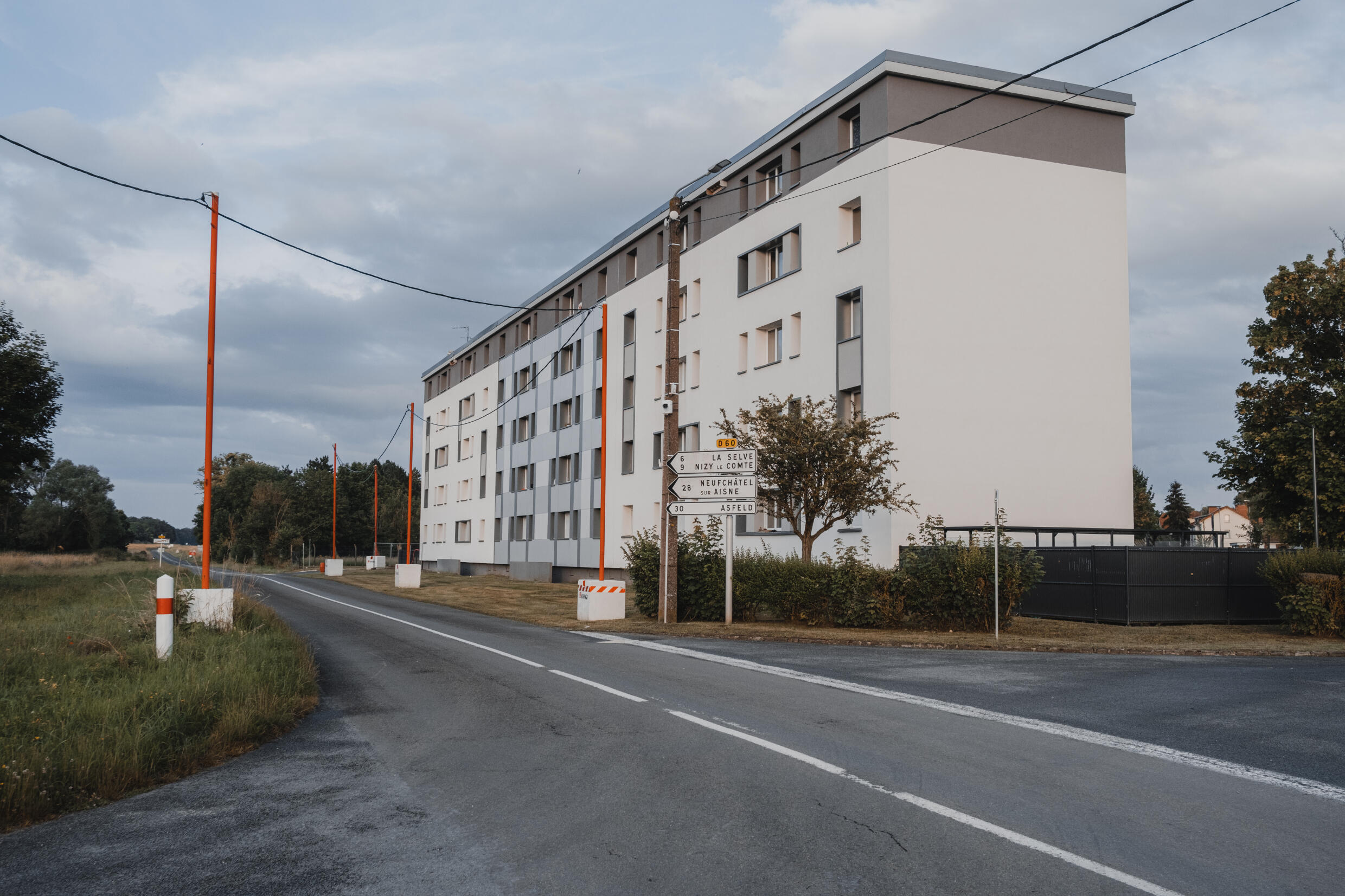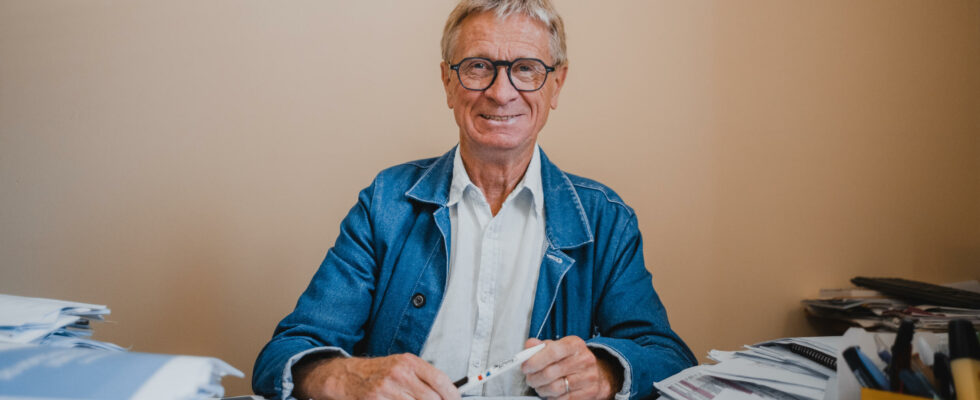The rural commune located in the Aisne (north) has been hosting around a hundred exiled people for six years. Like the rest of the department, it voted massively in favor of the National Rally during the first round of the legislative elections on Sunday, June 30.
The electoral signs have disappeared from the sidewalks of Sissonne. In this town of 2,100 inhabitants planted in the middle of fields, the legislative elections are already a thing of the past. The die was cast on Sunday, June 30: 57% for the National Rally candidate Nicolas Dragon, three points more than in the rest of the constituency. A result that reflects that of the European elections and in line with most of the elections over the last ten years.
At the bar-tabac-PMU, the regional daily The union which sits on the counter returns to its local pages on the results of the first round. Three quarters of the municipalities of Laonnois, where Sissonne is located, voted more than 50% for Nicolas Dragon. And four of the five constituencies of the department elected an RN candidate in the first round. But there is no question of talking about it inside the café. The landlady is there to ensure it. We talk about the weather, the weather, each other, but not politics. What customers say to you is their own business. We are apolitical. ” she insists, not easily.
“Mr. Nobody”
Standardized, the RN vote remains a sensitive subject in Sissonne. To bring it up often means hitting a wall. Those who agree to discuss it see it in any case as an expression of a generalized fed-up feeling on the part of an abandoned population. We are nothing, we don’t exist, except when it comes to paying taxes. “, grumbles a retiree met at the hair salon. Like most of the people interviewed, he requests anonymity. ” You just have to call me “Mr. Nobody” ” he suggests, mockingly, between two snips of the scissors.
At first glance, Sissonne is not a depressed town. It is even rather pretty with its flower boxes along the road and its tree-lined town centre. In terms of services, it is also well-off. This former cantonal capital is home to a school, a college, two doctors, a dentist, an optician, two restaurants, a pharmacy, a supermarket, a municipal swimming pool… And soon a social life centre with a library, café, exhibition space and teaching kitchen. The ” baby » by Mayor Christian Vannobel.
But behind the scenes, the reality is less rosy. Housing is selling for 1,000 euros per square meter, compared to 2,000 in a neighboring town. The factory that employed 400 people closed twelve years ago. The average income per capita is now one of the lowest in the department. According to the city councilor’s calculations, about 5% of the population benefits from the RSA (active solidarity income), twice as much as at the national level. We are afraid for our children, admits a fifty-year-old. Fear that they won’t find a job, fear of insecurity. »
The other’s fault
For Christian Vannobel, the trigger for the RN vote is there. It is the reptilian brain that acts. It is this fear that makes us attack. Currently, it pushes not only to withdrawal, but to turn to extremes. “, interprets this former doctor, who accuses Marine Le Pen’s party of manipulating minds by allowing the idea to creep in that misfortune is always due to others.
“The other” in Sissonne lives along the departmental road at the exit of the town. One hundred and fifteen people, refugees or asylum seekers, live in this immaculate building near the military camp. Most come from Afghanistan. The first families settled there six years ago, at the initiative of the Aisne prefecture. I found it wonderful “, confides the mayor elected in 2014. A public meeting had first been organized to reassure the population. That evening, a sign “No to refugees” had been brandished and some racist remarks had been made. ” Questions were asked about imported diseases and the impact on real estate “, remembers Christian Vannobel.

Six years later, some fears have been allayed. A woman who had opposed the settlement of refugees even came to ask the mayor to keep one of the families in Sissonne. Her granddaughter had become friends with the children of this family and she did not want them to go to another center. “, he smiles. The elected official is convinced: these refugees are an opportunity for his community. ” They help to combat rural depopulation. The presence of allophone students has allowed us to open an additional class. And then it is a permanent cultural exchange. ” he boasts.
But the day before the first round, Christian Vannobel advised them not to go to the town on election night. He feared that, with the help of alcohol, the euphoria of victory does not cause violence. Exiled people always crystallize the resentment of a part of its administrators. According to a shopkeeper, not a day goes by without hearing about it. We see them with their latest phones, paid to do nothing. “, blames “Mr. Nobody”. ” We give them everythinghaswhen there are retirees who have worked all their lives and have nothing “, adds the fifty-year-old, echoing the speeches of the extreme right.
“What will be our fate?”
For Patou, father of two children aged sixteen and eleven, this “everything” is summed up in the subsidy that the State pays him as an asylum seeker. A meager sum that allows him to pay for groceries, the canteen and transport. He would like to be able to work, but in France, asylum seekers are not allowed to. So, to keep himself busy, this native of Kinshasa wanders the streets and, when he can, treats himself to a trip to Paris to get a haircut or buy local products.
Read alsoOn InfoMigrants – France: what social benefits are foreigners entitled to?
At the foot of the accommodation centre, the car park has been transformed into a playground thanks to a clearing. Kids are kicking a ball around under the supervision of their parents. Two youngsters come riding scooters. They work in construction in Saint-Erme, six kilometres away. The criticism aimed at them seems not to affect them. Life is nice here. It’s quiet. People respect me as I respect them. “, greets one. ” Life is very good, it’s quiet ” confirms the other.
The only downside: transport. Getting to Laon, the prefecture, is quite an adventure. And with only three buses a day, it’s mostly a lot of waiting. To be there at 10am, I have to get up at 5:30am, walk 40 minutes to the bus stop to catch the 6:30am bus to Saint-Erme. It’s the only one of the morning. Then I wait for the train that leaves at 7:10am and arrives a quarter of an hour later in Laon. After that, I just have to wait for the prefecture or the shops to open. ” says Jumakhan, helped by his nine-year-old daughter when the words fail to come.
For all, Sissonne is just a stopover before being able to settle in a larger city. Patou, for his part, fears that in the event of a victory by the extreme right, it will be the last before a forced return to the country. If the little we are given is cut off, what will be our fate? ” he wonders out loud.
